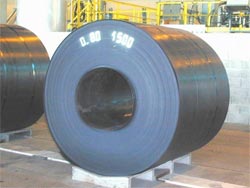Siemens receives FAC for Arvedi ESP line

First 0.8 mm thick coil produced on the Arvedi ESP line at Acciaieria Arvedi, Cremona, Italyl
Following the fulfillment of the guaranteed performance figures by the new Arvedi ESP (Endless Strip Production) line in Cremona, the Italian steel producer Acciaieria Arvedi S.p.A. issued the Final Acceptance Certificate (FAC) to Siemens VAI. Several technological milestones were achieved, including the casting of 80 mm thin strands at speeds in excess of six meters per minute and hot-strip rolling down to a thickness of 0.8 mm.
Strip dimensions meet the geometrical requirements for cold rolling, allowing the conventional cold-rolling process step to be dispensed with for many industrial applications. According to Giovanni Arvedi, inventor of the process, “Operation of the Arvedi ESP line at Acciaieria Arvedi has fully met expectations and overall product quality is excellent.”
Since the start-up of the Arvedi ESP line in early 2009 and the commencement of endless strip production in June 2009, continuous operational improvements and strip-thickness reductions have been achieved. Thin and ultra-thin strip with widths up to 1,600 mm have been rolled and coiled in weights up to 32 tons in this highly compact 190 m long production facility. During routine operations endless casting and rolling of nine heats totaling 2,250 tons of steel was achieved of which 55% (1,250 tons) was rolled at thicknesses of 1–1.2 mm. This confirms the stable and reliable process operations. Longer production sequences are planned in the near future. A wide range of carbon- and HSLA (high-strength, low alloy) steel grades were produced to date, all of which was commercially sold.
Arvedi ESP technology is characterized by the production of hot-rolled coils in a thin-slab casting/rolling plant directly from liquid steel in a continuous and uninterrupted manufacturing process. Arvedi ESP lines are capable of producing more than two million tons of hot-rolled coils per year. Products are used in the automotive, appliance and building sectors, as well as for the production of tubes, profiles, machinery and mechanical equipment. The proven ability of Arvedi ESP lines to roll ultra-thin strip gauges at maximum design widths and at full production capacity offers producers the possibility to exploit highly attractive market segments with lower-cost products.
The Siemens Industry Sector (Erlangen, Germany) is the worldwide leading supplier of environmentally friendly production, transportation, building and lighting technologies. With integrated automation technologies and comprehensive industry-specific solutions, Siemens increases the productivity, efficiency and flexibility of its customers in the fields of industry and infrastructure. The Sector consists of six divisions: Building Technologies, Drive Technologies, Industry Automation, Industry Solutions, Mobility und Osram. With around 207,000 employees worldwide (September 30), Siemens Industry achieved in fiscal year 2009 total sales of approximately €35 billion.
The Siemens Industry Solutions Division (Erlangen, Germany) is one of the world's leading solution and service providers for industrial and infrastructure facilities comprising the business activities of Siemens VAI Metals Technologies, Water Technologies and Industrial Technologies. Activities include engineering and installation, operation and service for the entire life cycle. A wide-ranging portfolio of environmental solutions helps industrial companies to use energy, water and equipment efficiently, reduce emissions and comply with environmental guidelines. With around 31,000 employees worldwide (September 30), Siemens Industry Solutions posted sales of €6.8 billion in fiscal year 2009.
Media Contact
All latest news from the category: Corporate News
Newest articles

Bringing bio-inspired robots to life
Nebraska researcher Eric Markvicka gets NSF CAREER Award to pursue manufacture of novel materials for soft robotics and stretchable electronics. Engineers are increasingly eager to develop robots that mimic the…

Bella moths use poison to attract mates
Scientists are closer to finding out how. Pyrrolizidine alkaloids are as bitter and toxic as they are hard to pronounce. They’re produced by several different types of plants and are…

AI tool creates ‘synthetic’ images of cells
…for enhanced microscopy analysis. Observing individual cells through microscopes can reveal a range of important cell biological phenomena that frequently play a role in human diseases, but the process of…





















